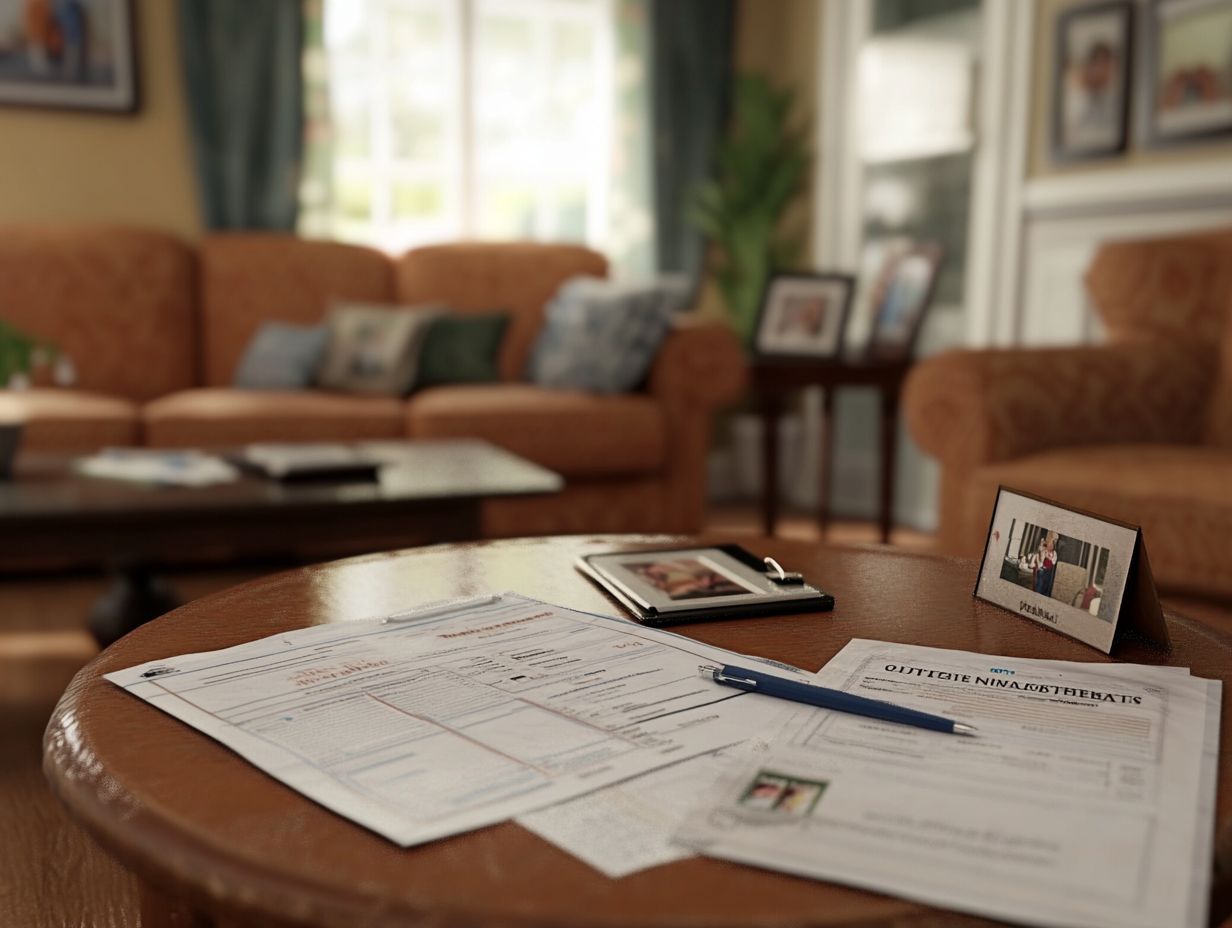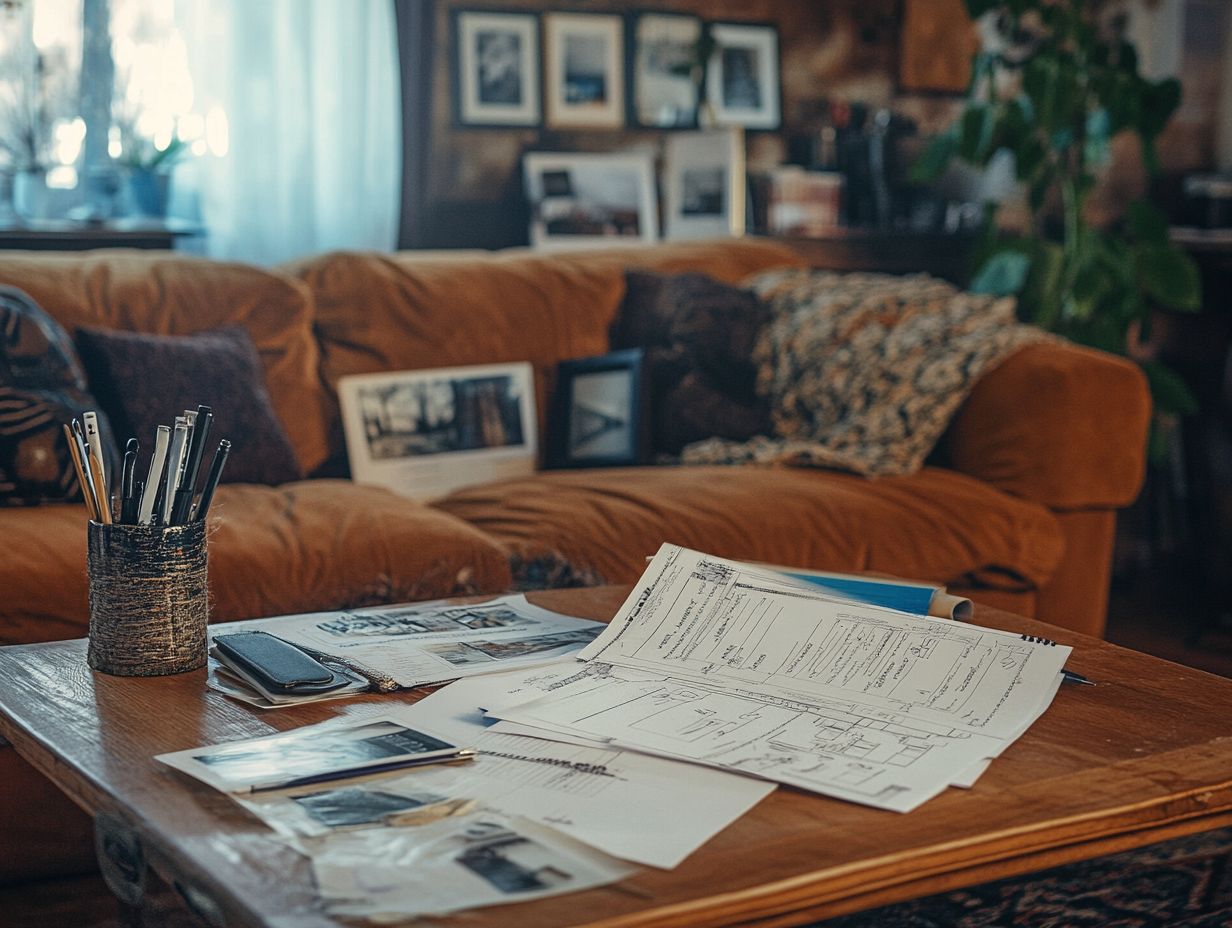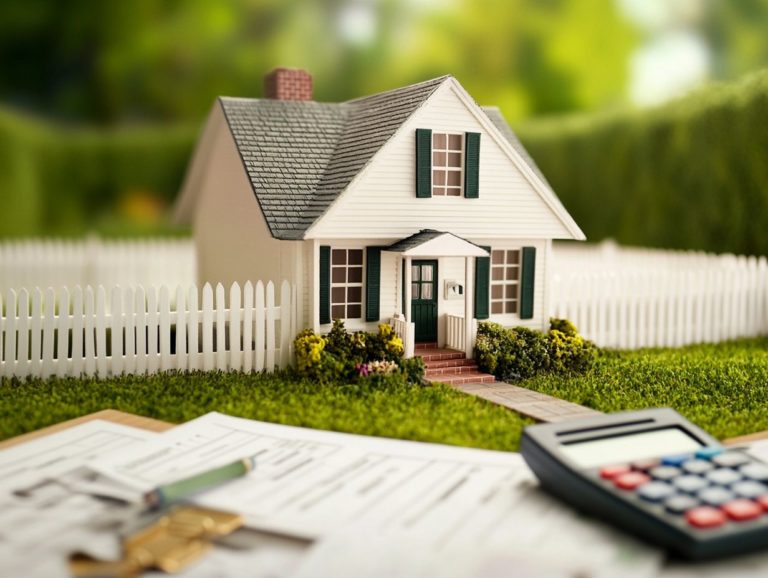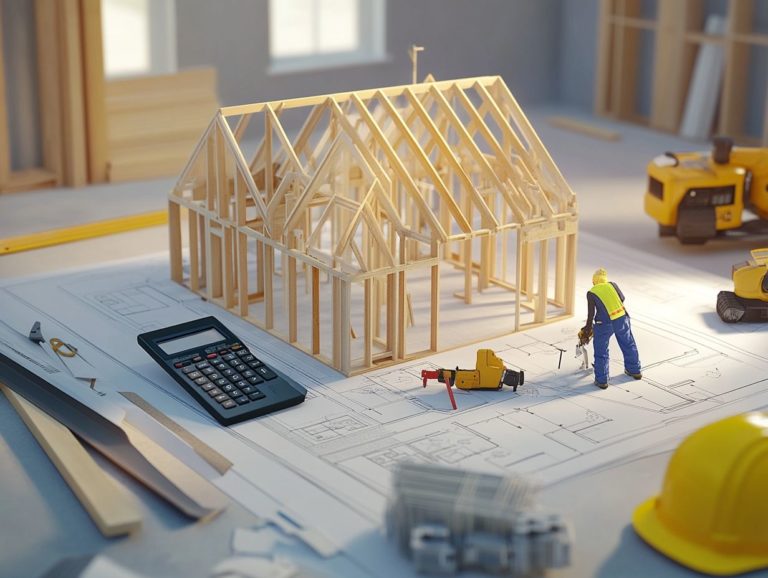5 Essentials of a Good Home Insurance Policy
Home insurance is not merely a safety net for your property; it s a vital investment that secures your financial future.
With the right policy in place, you can protect not just the structure of your home, but also your personal belongings, liability, and additional living expenses during emergencies.
This article highlights five essential components of a comprehensive home insurance policy. We will delve into key considerations, the various types of policies, common exclusions, and the necessary steps for filing claims.
Understanding these elements helps you protect your home wisely.
Contents
- Key Takeaways:
- 1. Adequate Coverage for the Structure of Your Home
- 2. Coverage for Personal Belongings
- 3. Liability Coverage
- 4. Additional Living Expenses Coverage
- 5. Protection Against Natural Disasters and Other Perils
- What Is Home Insurance and Why Is It Important?
- What Factors Should Be Considered When Choosing a Home Insurance Policy?
- What Are the Different Types of Home Insurance Policies?
- What Are Some Common Exclusions in Home Insurance Policies?
- How Can a Homeowner Ensure They Have Adequate Coverage?
- What Steps Should Be Taken in Case of a Home Insurance Claim?
- Frequently Asked Questions
- What are the 5 essentials of a good home insurance policy?
- Why is it important to have coverage for the structure of your home?
- What is personal belongings coverage and why do I need it?
- What is liability protection and why is it included in a good home insurance policy?
- Do I really need additional living expenses coverage in my home insurance policy?
- Is medical payments to others coverage necessary in a home insurance policy?
Key Takeaways:

Act now! Make sure your home insurance policy provides adequate coverage for your home’s structure. Ensure your policy covers personal belongings and provides liability coverage. Additionally, it’s wise to review the key features of comprehensive home insurance, including coverage for additional living expenses and protection against natural disasters and other perils when choosing a policy.
1. Adequate Coverage for the Structure of Your Home
Adequate coverage for your home’s structure is essential when it comes to homeowners insurance. It protects you from significant financial losses due to perils like fire, flood, and natural disasters. Additionally, considering essential add-ons for home insurance coverage ensures that your home can be rebuilt to current building codes if damage or total loss occurs.
To evaluate the right amount of dwelling coverage, start by accurately assessing your home’s value. Consider factors such as square footage, construction materials, and local building costs.
Understanding the difference between replacement cost focused on rebuilding with similar materials and actual cash value, which takes depreciation into account, is critical for selecting the best policy options.
For instance, if a fire were to completely destroy your home, having replacement cost coverage would serve you far better than actual cash value. The latter may leave you underinsured. Working with insurance agents and mortgage lenders can provide invaluable insights for establishing appropriate coverage limits.
Now, picture a devastating storm that wreaks havoc on your roof. With the right policy in place, you can recover without the burden of overwhelming out-of-pocket expenses, all while satisfying your lender s requirements for property protection.
2. Coverage for Personal Belongings
Coverage for personal belongings is a vital component of homeowners and renters insurance. It safeguards your high-value items think fine art, jewelry, and electronics from theft, fire, and other potential losses. This coverage ensures that you can have peace of mind, knowing your prized possessions are protected.
Grasping the nuances of personal property coverage is essential when selecting the right insurance plan. Standard homeowners policies usually encompass a broad spectrum of personal items, while specialized renters insurance can offer tailored protection for those who don t own a home.
It’s important to keep in mind that coverage limits often come into play, especially for your high-value belongings. You might need to consider additional coverage or a rider an additional policy that provides extra coverage to fully shield your valuable items.
Creating a detailed home inventory can greatly simplify the claims process. This ensures that all your possessions are documented and valued accurately. Securing your personal belongings can qualify you for various insurance discounts, ultimately lowering your overall costs while enhancing your protection.
3. Liability Coverage
Liability coverage is an essential part of homeowners insurance. It acts as your financial safety net against claims arising from injuries or damages on your property. This coverage ensures you are shielded from potentially overwhelming legal costs.
Within this realm, personal liability coverage plays a pivotal role. It protects you if someone suffers an injury or experiences property damage while on your premises. Additionally, medical payments coverage steps in to cover immediate medical expenses, no questions asked, regardless of who s at fault.
Selecting the right liability limits is crucial. Underestimating your coverage can leave you vulnerable to significant out-of-pocket expenses. Investing in security systems can also be a savvy move. Not only do they enhance safety, but they can also lower your insurance premiums by showcasing your commitment to risk reduction.
It’s equally important to stay informed about common exclusions, like intentional damage or certain breed restrictions for pets. These could undermine the effectiveness of your liability protection.
4. Additional Living Expenses Coverage

Additional living expenses coverage is a vital part of your homeowners insurance. It helps you manage costs when your home is uninhabitable due to events like fire or flooding.
This coverage typically includes costs for temporary housing, meals, and other essential living expenses during the claims process. You must understand what is covered, as policies vary widely.
Maintaining a positive relationship with your mortgage lender can help alleviate stress during repairs. They may offer flexibility with payments while work is underway.
Being proactive about home maintenance can help reduce claims. This not only creates a safer environment but can also potentially lower your insurance premiums.
5. Protection Against Natural Disasters and Other Perils
Protection against natural disasters is crucial for homeowners. Standard homeowners insurance often leaves certain events, like floods and earthquakes, uncovered.
You need to explore additional policies or riders to ensure your property is comprehensively protected. Understanding the limits of standard policies is vital, especially in disaster-prone areas.
While typical policies may cover fire or theft, they often omit water damage from floods or earthquake structural damage. This creates significant gaps in your coverage.
This reality means you should pursue specialized insurance options, like flood or earthquake insurance. These options provide peace of mind amid unpredictable weather.
Seeking professional advice and obtaining multiple insurance quotes can enhance your understanding of each policy. This knowledge empowers you to make informed decisions tailored to your needs.
What Is Home Insurance and Why Is It Important?
Home insurance is a crucial financial tool that protects your property. It covers risks like property damage and personal liability, helping you meet mortgage requirements.
Understanding home insurance is vital, as it safeguards not only the structure of your home but also your valuable possessions. When selecting a policy, be sure to consider the key features to look for in home insurance providers, such as dwelling coverage and personal property protection, which cater to specific needs.
When filing a claim, you may interact with claims adjusters who assess damages and determine compensation based on your policy. If you re securing a mortgage, specific insurance requirements may apply to protect the lender s investment.
This highlights the importance of comprehensive coverage as part of a solid financial strategy.
What Factors Should Be Considered When Choosing a Home Insurance Policy?
When selecting a home insurance policy, consider factors like the coverage you need and what to look for in home insurance coverage, as well as available options, insurance rates, deductibles, and potential discounts.
Determining the right level of coverage is essential; it should reflect your home’s true value. Evaluating various options, such as liability and personal property coverage, allows you to customize your home insurance policy to your needs.
Insurance rates vary widely based on location and risk factors. Thorough comparisons across providers are necessary.
Understanding deductibles is crucial; a higher deductible may lower your monthly premiums but could lead to higher out-of-pocket costs when filing a claim.
Finally, recognizing available discounts, like bundling policies or maintaining a claims-free history, can lead to substantial savings while ensuring comprehensive coverage.
What Are the Different Types of Home Insurance Policies?

Ready to dive into the world of home insurance? Let’s explore the various types and find the right protection for you!
You ll find a variety of home insurance policies on the market, including standard homeowners insurance, specialized policies for high-value items, and renters insurance. Each option is tailored to meet specific needs and provide appropriate coverage limits for different living situations.
Understanding the differences between these policies is crucial. It helps you protect your belongings and property effectively.
Homeowners insurance typically covers the structure of your home, along with personal property and liability protection. This makes it ideal for those who own property.
On the other hand, renters insurance is designed for individuals leasing their accommodations, safeguarding personal possessions without extending coverage to the building itself.
Keep in mind that the dynamic insurance market can influence your available options. Companies continuously adjust their offerings based on regional risks and economic conditions. This ultimately affects the pricing and coverage details you ll encounter as a consumer.
What Are Some Common Exclusions in Home Insurance Policies?
Understanding common exclusions in home insurance policies is essential for you as a homeowner. To better navigate your coverage, consider the 5 must-ask questions about your home policy. These exclusions can greatly affect the claims process and leave you exposed to financial loss if damage occurs or liability claims arise.
Exclusions often include incidents like flood damage, which typically requires a separate flood insurance policy for adequate coverage. Personal liability incidents, such as dog bites or injuries sustained by guests on your property, can also fall outside your standard coverage.
Many policies do not cover earthquake damage or certain types of mold. This can lead to unexpected out-of-pocket expenses.
To prevent unpleasant surprises when it comes time to file a claim, it’s crucial for you to carefully check your policy terms, understand these exclusions, and consider 5 things to know before buying home insurance tailored to your unique risks.
How Can a Homeowner Ensure They Have Adequate Coverage?
To ensure you have adequate coverage, it’s essential to regularly evaluate your insurance policies. Obtaining multiple quotes and maintaining a comprehensive inventory of your home can be beneficial. Additionally, understanding the benefits of having home insurance can help you seek expert advice to address any gaps in your coverage that might leave you underinsured.
Conducting a thorough home inventory assessment is key. It provides a detailed list of your personal belongings, ensuring that all valuable items are accounted for in your coverage.
This process not only helps you determine appropriate coverage limits but also simplifies the claims process when the time comes.
As market values shift, you must remain vigilant and update your insurance policies to accurately reflect any changes in your property’s worth. Seeking reliable insurance insights from credible sources, like financial advisors or certified insurance agents, can offer invaluable perspectives and highlight potential improvements in your coverage that you might otherwise overlook.
What Steps Should Be Taken in Case of a Home Insurance Claim?
If you need to make a claim, act quickly! Follow a systematic claims process that involves promptly reporting the incident to your insurance company, thoroughly documenting the damage, and cooperating with claims adjusters to facilitate a smooth resolution while keeping your insurance premiums in check.
It s essential to kick off this process without delay, as any holdup could impact your coverage options. Start by taking comprehensive photographs of the damage, capturing various angles and any personal belongings that were affected.
Next, create a detailed list of damaged items, including their estimated values; this will prove invaluable when you communicate with adjusters.
Engage with claims adjusters clearly and respectfully, sharing all necessary details while appreciating their role in evaluating the claim. Familiarizing yourself with your insurance policies will give you the power to ask informed questions, contributing to a smoother claims experience overall.
Frequently Asked Questions

What are the 5 essentials of a good home insurance policy?
The 5 essentials of a good home insurance policy include:
- Coverage for the structure of your home
- Personal belongings coverage
- Liability protection
- Additional living expenses
- Medical payments to others
Why is it important to have coverage for the structure of your home?
This coverage protects your home and other structures on your property. It guards against damage from events like fire, hail, and vandalism.
What is personal belongings coverage and why do I need it?
This coverage protects your belongings, including furniture and electronics. It ensures you can replace items if they are lost or damaged.
What is liability protection and why is it included in a good home insurance policy?
Liability protection covers you if someone is injured on your property. It pays for their medical expenses and legal fees if they sue.
Do I really need additional living expenses coverage in my home insurance policy?
This coverage pays for your living costs if your home is uninhabitable. It includes hotel stays and meals while you find a new place.
Is medical payments to others coverage necessary in a home insurance policy?
While optional, this coverage is highly recommended. It pays for medical expenses if someone is injured on your property, regardless of who is at fault.






